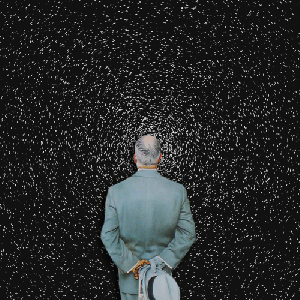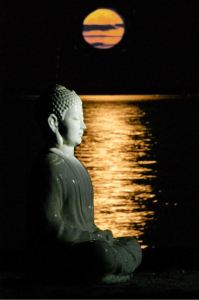Dharma talks aren’t the truth

“Dharma talks aren’t the truth. The true Dharma exists in the mind of the students as seeds and the Dharma talks are just like a little cloud that releases rain and causes the seeds in the mind of the practitioners to sprout and manifest.” ― Thich Nhat Hanh
The Buddha’s first doctrine was the Four Noble Truths
Jetsunma Tenzin Palmo
The Buddha’s first doctrine was the Four Noble Truths. The first Truth is that the nature of samsara is dukkha, which is sometimes translated as suffering, but that sometimes is a little bit too strong. People say sometimes, “Well, I’m not suffering.” But it doesn’t really just mean suffering; dukkha is the opposite of sukha, which means ease. So, dukkha is dis-ease: it’s this un-ease, un-satisfactoriness, this sense that everything would be perfect ‘if only’. People sometimes feel totally satisfied and content, but it doesn’t last. Then something is always wrong. There’s always something.
If the Buddha had left it there, it would be a very pessimistic doctrine. But the Buddhas and bodhisattvas are always smiling. They look happy and content. Why? Because of the Third Noble Truth— the fact that there is a cessation to this dukkha. We don’t have to be stuck in it forever. There’s a way beyond dukkha, which in the traditional texts is called Nirvana.
The Buddha didn’t just leave it with that, saying, “Okay, there is a way out of this—it’s called Nirvana.” In the Fourth Noble Truth he gave the path, which includes ethics, how to lead your life, meditation training and so forth; he gave us everything that we need in the path for our daily life, including Right Livelihood. So, he was also thinking in terms of lay people, how to use everything in your life as a means for the path.
– Jetsunma Tenzin Palmo
Photo: Jetsunma standing with a fellow nun from Gebchak Nunnery in front of a mud house on a trip to Tibet (2007)
The beginning of courage

Someone asked me recently if I am afraid to die. Truthfully, I am more afraid of not living my life fully — of living a life dedicated to cherishing and protecting myself. This fear-driven approach to life is like covering your couch in plastic so it won’t get worn. It robs you of the ability to enjoy and appreciate your life. It takes courage to accept life fully, to say yes to our life, yes to our karma, yes to our mind, emotions, and whatever else unfolds. This is the beginning of courage. Courage is the fundamental openness to face even the hardest truths. It makes room for all the pain, joy, irony, and mystery that life provides.
– Dzigar Kongtrul Rinpoche
from the book “It’s Up to You: The Practice of Self-Reflection on the Buddhist Path”
Truth is ever present

Truth is perfect and complete in itself. It is not something newly discovered; it has always existed. Truth is not far away; it is ever present. It is not something to be attained since not one of your steps leads away from it.
The beginning of courage
Someone asked me recently if I am afraid to die. Truthfully, I am more afraid of not living my life fully — of living a life dedicated to cherishing and protecting myself. This fear-driven approach to life is like covering your couch in plastic so it won’t get worn. It robs you of the ability to enjoy and appreciate your life. It takes courage to accept life fully, to say yes to our life, yes to our karma, yes to our mind, emotions and whatever else unfolds. This is the beginning of courage. Courage is the fundamental openness to face even the hardest truths. It makes room for all the pain, joy, irony, and mystery that life provides.
– Dzigar Kongtrul Rinpoche
from the book “It’s Up to You: The Practice of Self-Reflection on the Buddhist Path”
Just Dharma Quotes
Zen Wisdom of Seng Tsan

The more you talk and think about it, the further astray you wander from the truth. Stop talking and thinking and there is nothing you will not be able to know.
Do not search for the truth; only cease to cherish opinions.
Do not remain in the dualistic state; avoid such pursuits carefully. If there is even a trace of this and that, of right and wrong, the Mind-essence will be lost in confusion.
Although all dualities come from the One, do not be attached even to this One.
When the mind exists undisturbed in the Way, nothing in the world can offend, and when a thing can no longer offend, it ceases to exist in the old way.”
~Seng Tsan
Hsin Hsin Ming 信心銘 – Faith in Mind
The immutable truth

If enlightenment comes first, before thinking, before practice, your thinking and your practice will not be self-centered. By enlightenment I mean believing in nothing, believing in something which has no form or no color, which is ready to take form or color. This enlightenment is the immutable truth. It is on this original truth that our activity, our thinking, and our practice should be based.
– Shunryu Suzuki
from the book “Zen Mind, Beginner’s Mind”
With thanks to Gems of Wisdom – Zen Tradition
Truth is like the moon, and words are like my finger

I can point to the moon with my finger, but my finger is not the moon.
~ Hui Neng, 6th century Zen Patriarch
Truth is ever present

Truth is perfect and complete in itself. It is not something newly discovered; it has always existed. Truth is not far away; it is ever present. It is not something to be attained since not one of your steps leads away from it.
– Dogen Zenji
from the book “Buddhism and Zen”
Confronted with the truth

Most of us tend to resent being confronted with the truth, and from resentment springs denial. The most obvious example is that we feel annoyed when we are forced to acknowledge the illusory nature of our lives and the reality of death. We also take exception to contemplating it, even though death is an irrefutable universal truth. Our habitual reaction is to pretend it will never happen — which is how we deal with most of the other inconvenient truths we find difficult to stomach.
– Dzongsar Khyentse Rinpoche
Relative and absolute truth

In Buddhist philosophy, anything that is perceived by the mind did not exist before the mind perceived it; it depends on the mind. It doesn’t exist independently, therefore it doesn’t truly exist. That is not to say that it doesn’t exist “somewhat”. Buddhists called the perceived world relative truth – a truth that is measured and labeled by our ordinary minds. In order to qualify as ultimate truth, it must not be fabricated, it must not be a product of the imagination, and it must be independent of interpretation.
– Dzongsar Khyentse Rinpoche
One Truth Without Relativity

Seeing the truth as it is, is the goal as well as the path. Confused existence, or samsara, is a complex situation based on passion, aggression, and ignorance. Its essence is turmoil. But unless you relate to passion, aggression, and ignorance as the path—understanding them, working with them, and treading on them—you will not discover the goal. By discovering the truth of confusion, or samsara, you are also discovering peace, or nirvana—freedom from confusion. Truth does not depend on formulas or alternative answers, but truth is seen to be one truth without relativity.
– Chögyam Trungpa
from the book “The Path of Individual Liberation: The Profound Treasury of the Ocean of Dharma, Volume One”
3 Universal Truths that Buddha Taught
Source link
sameoldzen.blogspot.ca
Chong Do
December 16, 2017
Relative and absolute truth

In Buddhist philosophy, anything that is perceived by the mind did not exist before the mind perceived it; it depends on the mind. It doesn’t exist independently, therefore it doesn’t truly exist. That is not to say that it doesn’t exist “somewhat”. Buddhists called the perceived world relative truth – a truth that is measured and labeled by our ordinary minds. In order to qualify as ultimate truth, it must not be fabricated, it must not be a product of the imagination, and it must be independent of interpretation.
Dzongsar Khyentse Rinpoche
Spiritual truth

“Spiritual truth is not something elaborate and esoteric, it is in fact profound common sense. When you realize the nature of mind, layers of confusion peel away. You don’t actually “become” a buddha, you simply cease, slowly, to be deluded. And being a buddha is not being some omnipotent spiritual superman, but becoming at last a true human being.”
Sogyal Rinpoche, The Tibetan Book of Living and Dying
Just as the honey is not sweetness, The words of Wu Hsin are not The truth
With thanks to Yvon at ivonprefontaine.com
Source: Pointers to Non-Duality | Teacher as Transformer
When I am mindful and present to the world in its past, present, and future moments the text I live comes to life with new meaning:

Just as the honey is not sweetness,
The words of Wu Hsin are not
The truth.
However, time spent with these words is like
The aftermath of rain.
In due course, a sprouting of
Understanding will occur and
Will bear fruit at a pace
Outside of one’s control.














Recent Comments